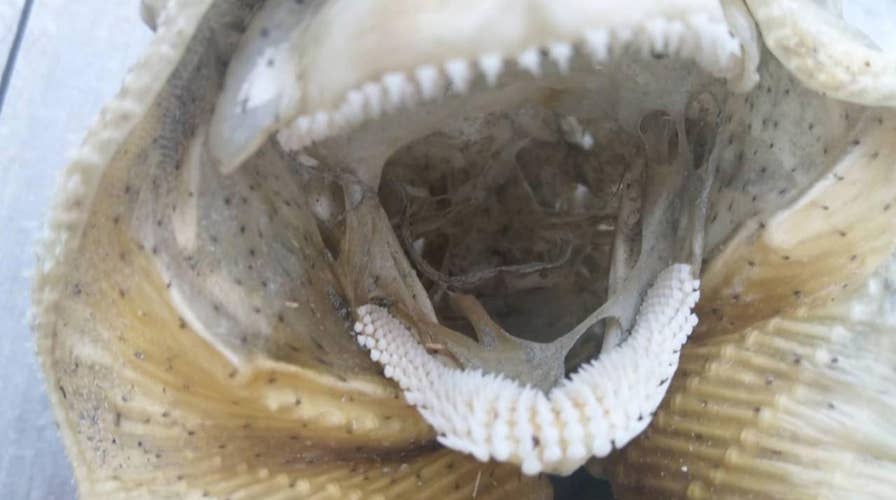Mysterious sea creature draws 'alien' comparisons
Marine biologists have identified a mysterious looking sea creature as a New Zealand rough skate. A mom and her daughter found it on a beach in the country and took to social media to figure out what it was.
Hanna Mary was strolling along a beach with her mom and pup close behind when she spotted what she first believed was plastic sheeting. After a rough storm hit Canterbury, New Zealand, last week, Mary anticipated piles of "rubbish" would wash ashore.
But when she inspected the bizarre-looking object Saturday at a Rakaia Huts beach, she shrieked after she realized it wasn't just another piece of trash — it was the skeleton of an alienlike critter.
"When I pulled it out and saw all the teeth and barbs I was convinced it was a rare deep-sea creature," Mary told Fox News. "I was so excited because I love the ocean and its inhabitants."
20-FOOT SEA CREATURE COVERED IN SHAGGY HAIR WASHES UP ON PHILIPPINES BEACH
Mary snapped several photos of the mysterious creature, capturing it at all angles. She then turned to social media in hopes of determining what type of species it was.
"Can anyone help identify this fish/ray/alien I found washed up at Rakaia Huts???" she inquired on Facebook.
Dozens of people offered suggestions — from a flying squirrel fish to a saw shark.

Hanna Mary posted photos of the creature online, hoping to identify it. (Hanna Mary)
"Alien definitely alien," one user replied.
"I don't know, looks blood creepy," another wrote, in part.
GIANT 'CONTRACTING' CREATURE SPOTTED ON BEACH STUNS FAMILY: 'IT'S ALIVE'
With its wings, small fins on its back, two "legs" on either side and "barbs all over" that look like teeth, Mary had to partially agree with her followers that it was definitely unusual. That's why she decided to take it to a local taxidermist, though he wasn't able to confirm anything.
Malcolm Francis, a fisheries scientist and marine ecologist at National Institute of Water and Atmospheric Research (NIWA), told the New Zealand Herald the creature is a New Zealand rough skate, also known as a Dipturus nasutus.
"They are called rough skate because they are very prickly ... it's quite common in Canterbury," Francis, who has been studying fish for more than 40 years, told the newspaper. "It's like flat shark, it has a skeleton made out of cartilage. They spend much of their time on the bottom."

A marine scientist believes it's a New Zealand rough skate. (Hanna Mary)
Francis said he was able to determine the rough skate was a male based on its "legs," which aren't actually legs at all.
"They look like legs, but they're not," he explained. "They are used to help the male hang onto the female when they are mating."
Mary said many social media users also believe it's a rough skate. However, she hasn't received any confirmation in person thus far. She's planning to take it to an expert for further testing.
"I'm just not sure what to do with it after," she admitted.

New Zealand rough skates often hang out in depths up to 700 feet. (Hanna Mary)
New Zealand rough skates can grow up to nearly 3 feet and typically swim about 700 feet below the ocean's surface, according to Talley's Group, a New Zealand-based agribusiness company. The company noted the species is "considered a delicacy" in the country.
Known for roaming the deep sea, Mary isn't sure how the creature's body made its way to the surface — but she's glad it did.
"Every day [the ocean's] getting more and more destroyed so it's great people get an opportunity to see one of its creatures that they normally wouldn't get to see," she added.
